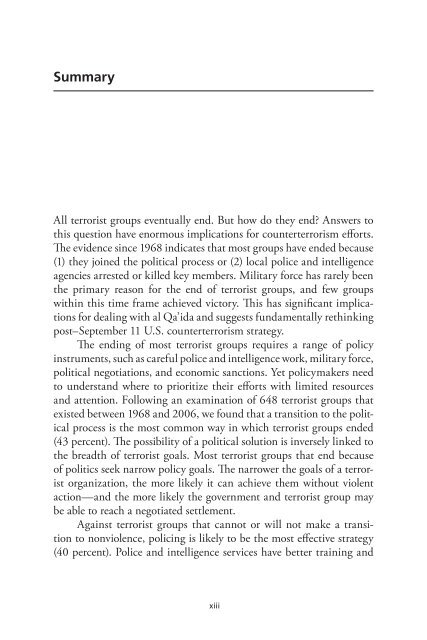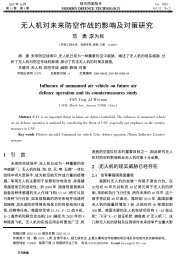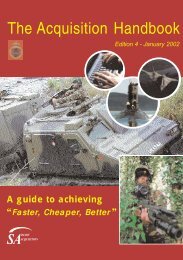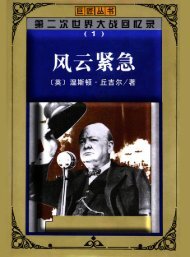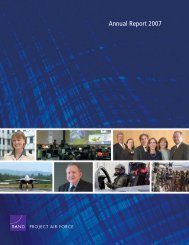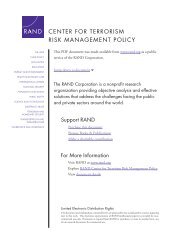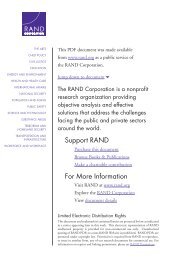- Page 1 and 2: THE ARTS CHILD POLICY CIVIL JUSTICE
- Page 3 and 4: HOW TERRORIST GROUPS END Lessons fo
- Page 5 and 6: About the Authors Seth G. Jones is
- Page 7: Preface By analyzing 648 groups tha
- Page 10 and 11: viii How Terrorist Groups End: Less
- Page 13: Tables 5.1. Insurgent Groups and In
- Page 17 and 18: Summary xv regime type, or the brea
- Page 19: Summary xvii ish government, among
- Page 23 and 24: Abbreviations ANC AQI ARENA ATAG BN
- Page 25: Abbreviations xxiii ONUSAL OPEC PKK
- Page 28 and 29: 2 How Terrorist Groups End: Lessons
- Page 30 and 31: 4 How Terrorist Groups End: Lessons
- Page 32 and 33: 6 How Terrorist Groups End: Lessons
- Page 34 and 35: 8 How Terrorist Groups End: Lessons
- Page 36 and 37: 10 How Terrorist Groups End: Lesson
- Page 38 and 39: 12 How Terrorist Groups End: Lesson
- Page 40 and 41: 14 How Terrorist Groups End: Lesson
- Page 42 and 43: 16 How Terrorist Groups End: Lesson
- Page 44 and 45: 18 How Terrorist Groups End: Lesson
- Page 46 and 47: 20 How Terrorist Groups End: Lesson
- Page 48 and 49: 22 How Terrorist Groups End: Lesson
- Page 50 and 51: 24 How Terrorist Groups End: Lesson
- Page 52 and 53: 26 How Terrorist Groups End: Lesson
- Page 54 and 55: 28 How Terrorist Groups End: Lesson
- Page 56 and 57: 30 How Terrorist Groups End: Lesson
- Page 58 and 59: 32 How Terrorist Groups End: Lesson
- Page 60 and 61: 34 How Terrorist Groups End: Lesson
- Page 62 and 63: 36 How Terrorist Groups End: Lesson
- Page 64 and 65:
38 How Terrorist Groups End: Lesson
- Page 66 and 67:
40 How Terrorist Groups End: Lesson
- Page 68 and 69:
42 How Terrorist Groups End: Lesson
- Page 71 and 72:
CHAPTER THREE Policing and Japan’
- Page 73 and 74:
Policing and Japan’s Aum Shinriky
- Page 75 and 76:
Policing and Japan’s Aum Shinriky
- Page 77 and 78:
Policing and Japan’s Aum Shinriky
- Page 79 and 80:
Policing and Japan’s Aum Shinriky
- Page 81 and 82:
Policing and Japan’s Aum Shinriky
- Page 83 and 84:
Policing and Japan’s Aum Shinriky
- Page 85 and 86:
Policing and Japan’s Aum Shinriky
- Page 87 and 88:
Policing and Japan’s Aum Shinriky
- Page 89 and 90:
CHAPTER FOUR Politics and the FMLN
- Page 91 and 92:
Politics and the FMLN in El Salvado
- Page 93 and 94:
Politics and the FMLN in El Salvado
- Page 95 and 96:
Politics and the FMLN in El Salvado
- Page 97 and 98:
Politics and the FMLN in El Salvado
- Page 99 and 100:
Politics and the FMLN in El Salvado
- Page 101 and 102:
Politics and the FMLN in El Salvado
- Page 103 and 104:
Politics and the FMLN in El Salvado
- Page 105 and 106:
Politics and the FMLN in El Salvado
- Page 107:
Politics and the FMLN in El Salvado
- Page 110 and 111:
84 How Terrorist Groups End: Lesson
- Page 112 and 113:
86 How Terrorist Groups End: Lesson
- Page 114 and 115:
88 How Terrorist Groups End: Lesson
- Page 116 and 117:
90 How Terrorist Groups End: Lesson
- Page 118 and 119:
92 How Terrorist Groups End: Lesson
- Page 120 and 121:
94 How Terrorist Groups End: Lesson
- Page 122 and 123:
96 How Terrorist Groups End: Lesson
- Page 124 and 125:
98 How Terrorist Groups End: Lesson
- Page 126 and 127:
100 How Terrorist Groups End: Lesso
- Page 129 and 130:
CHAPTER SIX The Limits of America
- Page 131 and 132:
The Limits of America’s al Qa’i
- Page 133 and 134:
The Limits of America’s al Qa’i
- Page 135 and 136:
The Limits of America’s al Qa’i
- Page 137 and 138:
The Limits of America’s al Qa’i
- Page 139 and 140:
Figure 6.2 Al Qa’ida’s Geograph
- Page 141 and 142:
The Limits of America’s al Qa’i
- Page 143 and 144:
The Limits of America’s al Qa’i
- Page 145 and 146:
The Limits of America’s al Qa’i
- Page 147 and 148:
CHAPTER SEVEN Ending the “War”
- Page 149 and 150:
Ending the “War” on Terrorism 1
- Page 151 and 152:
Ending the “War” on Terrorism 1
- Page 153 and 154:
Ending the “War” on Terrorism 1
- Page 155 and 156:
Ending the “War” on Terrorism 1
- Page 157 and 158:
Ending the “War” on Terrorism 1
- Page 159 and 160:
Ending the “War” on Terrorism 1
- Page 161 and 162:
Ending the “War” on Terrorism 1
- Page 163 and 164:
Ending the “War” on Terrorism 1
- Page 165:
Ending the “War” on Terrorism 1
- Page 168 and 169:
Table A.1 Organizations in the Data
- Page 170 and 171:
Table A.1—Continued Organization
- Page 172 and 173:
Table A.1—Continued Organization
- Page 174 and 175:
Table A.1—Continued Organization
- Page 176 and 177:
Table A.1—Continued Organization
- Page 178 and 179:
Table A.1—Continued Organization
- Page 180 and 181:
Table A.1—Continued Organization
- Page 182 and 183:
Table A.1—Continued Organization
- Page 184 and 185:
Table A.1—Continued Organization
- Page 186 and 187:
Table A.1—Continued Organization
- Page 188 and 189:
Table A.1—Continued Organization
- Page 190 and 191:
Table A.1—Continued Organization
- Page 192 and 193:
Table A.1—Continued Organization
- Page 194 and 195:
Table A.1—Continued Organization
- Page 196 and 197:
Table A.1—Continued Organization
- Page 198 and 199:
Table A.1—Continued Organization
- Page 200 and 201:
Table A.1—Continued Organization
- Page 202 and 203:
Table A.1—Continued Organization
- Page 204 and 205:
Table A.1—Continued Organization
- Page 206 and 207:
Table A.1—Continued Organization
- Page 208 and 209:
Table A.1—Continued Organization
- Page 210 and 211:
Table A.1—Continued Organization
- Page 212 and 213:
Table A.1—Continued Organization
- Page 214 and 215:
188 How Terrorist Groups End: Lesso
- Page 216 and 217:
190 How Terrorist Groups End: Lesso
- Page 218 and 219:
192 How Terrorist Groups End: Lesso
- Page 220 and 221:
194 How Terrorist Groups End: Lesso
- Page 222 and 223:
196 How Terrorist Groups End: Lesso
- Page 224 and 225:
198 How Terrorist Groups End: Lesso
- Page 226 and 227:
200 How Terrorist Groups End: Lesso
- Page 228 and 229:
202 How Terrorist Groups End: Lesso
- Page 230 and 231:
204 How Terrorist Groups End: Lesso
- Page 232 and 233:
206 How Terrorist Groups End: Lesso
- Page 234 and 235:
208 How Terrorist Groups End: Lesso
- Page 236 and 237:
210 How Terrorist Groups End: Lesso
- Page 238 and 239:
212 How Terrorist Groups End: Lesso
- Page 240 and 241:
214 How Terrorist Groups End: Lesso
- Page 242 and 243:
216 How Terrorist Groups End: Lesso
- Page 244 and 245:
218 How Terrorist Groups End: Lesso
- Page 246 and 247:
220 How Terrorist Groups End: Lesso
- Page 249 and 250:
Index affiliated groups, 115 affili
- Page 251:
Revolutionary United Front (RUF), 3


